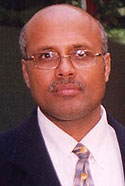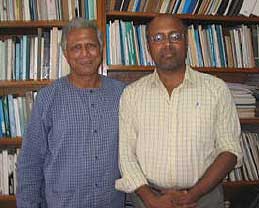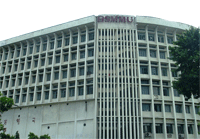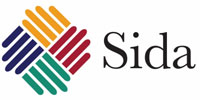SWEDISH SOUTH ASIAN STUDIES NETWORK
Division of Medical Engineering, School of Technology and Health (STH), Royal Institute of Technology (KTH), Stockholm
– Research connected to South Asia
– Educational links with Bangladesh
– Linnaeus Palme exchange project with Bangladesh
– Partner driven Indo-Swedish collaboration project on Mobile Diagnostic Systems
Address: Avdelningen för Medicinsk Teknik, Skolan för teknik och hälsa, KTH, Alfred Nobels Allé 10, SE-141 52 Huddinge, Sweden
Fax: +46 (0)8 21 83 68
Web page: http://www.kth.se/sth/forskning/medicisink_teknik
 Contact person: Dr. Mannan
Mridha, phone: +46 (0)8 790 4858.
Contact person: Dr. Mannan
Mridha, phone: +46 (0)8 790 4858.
Dr. Mridha is also working at the School of Innovation, Design and Engineering, Mälardalen University (MDH), Campus Västerås.
The Division of Medical Engineering started in 2004 with the aim to develop interdisciplinary research in the medical imaging area. The division is a part of the KTH School for Technology and Health (one of the nine schools that KTH is divide into), and is localized next to Karolinska university hospital in Flemingsberg in southern Stockholm. The overall objectives are to provide easier diagnosing of cardiovascular disease, to validate and develop non invasive imaging techniques and to quantify skeletal muscles diseases. The research focus on parametric imaging of ultrasound images, where the concept is to clearly visualize the parameters with the best diagnostic values. Other research projects are automatic analysis of human motion in real time, further development of the gammacamera, multifunction catheters and wireless communication.
New methods and work with improvements to existing methods for diagnostics, monitoring, and treatment within healthcare and medical applications are developed. Research projects deal with describing physiological processes for predicting results from treatments. Development of new sensor systems is another field of research, and so is improved and simplified information transfer within the different parts of medical services.
In close collaboration with Karolinska University Hospital, research and development is also carried out with an anbition to get a better understanding of the complex relations between the way we build, design and organize medical equipment, production and working processes and the effects these have on personal safety, health and well being.
In 2008 the Department of Applied Information Technology (2IT) at the KTH School of Information
and Communication Technology (ICT) was closed down. Some researchers connected to 2IT, incl. Dr. Mannan Mridha, were then shifted over to the Division of Medical Engineering at the School of Technology and Health.
Research connected to South Asia
Dr Mannan Mridha was born in Bangladesh and acquired basic education from Warsaw Technical University, Poland and Linköping University in Sweden. He defended his doctoral dissertation on ”Characterization of Cutaneous Oedema. Modelling and Measurements Methods” at Linköping University in 1990, and has working experience with teaching and research in biomedical engineering at universities in Sweden, UK, USA, India, Bangladesh and Japan. Besides he has also worked as WHO consultant with medical equipment in many developing countries such as Vietnam, Fiji and Palau. He has been awarded fellowships from the Royal Swedish Academy, Royal Society for Science and Engineering in the UK, and by the Japan Society for Promotion of Science.
Mridha is involved in research on biomedical engineering,
focusing on developing tools for diagnostic and therapeutic purposes with
the aim to develop a preventive health care technology, at a low cost
so that it can be attractive for use in developing countries. He has also
done research on the development of low cost intelligent devices for environmental
urban air quality monitoring.
Along with Björn Pehrson, professor
in telecommunication systems at KTH, Mridha wrote a paper called ”To
develop a telemedicine system to improve remote diagnoses and to deliver
a cost-effective, better-quality specialist services in developing countries”
presented at the 2nd International Workshop on Open Access, held at the
department on 11-12 May 2004. More
information on the Open Access 2004 conference (sponsored by Sida,
the Swedish International Cooperation Agency, and the UN ICT Task Force).
Abstract: Most of the people in the developing countries
are living in the rural areas with inadequate health care delivery system
and shortage of medical specialists. With the decline in the computer
price, rapid improvement in the telecommunication facilities and introduction
of Internet connections, it is an exciting challenge to introduce telemedicine
in the developing countries. It can be expected that telemedicine may
help to integrate the rural medical infrastructure to share resources
with expert services both nationally and internationally. Based on the
outcome of a workshop on telemedicine that was held in Dhaka, Bangladesh,
in January 2004, we propose a project to develop some basic telemedicine
services to be provided to rural health-centres in collaboration with
Grameen Healthping, Mlardaden in Vster and the BIRDEM hospital in Bangladesh.
We plan to develop guidelines for proper management of medical equipment
for clinical data collection, reliable transmission of data between the
patient at the rural centre and the specialists at the referred centre
by developing reliable software and hardware platform appropriate for
the existing infrastructure. The project will also evaluate the clinical
effectiveness, security, reliability of telemedicine technology and its
effects on quality, cost and accessibility of care and investigate ways
for its sustainability.
In November 2005 Dr. Mridha received was given SEK 600 000 as a three years Swedish Research Links (Asian–Swedish research partnership programme) grant by Sida and the Swedish Research Council, for a project titled ”Design and development of portable medical device for application in the developing countries”. The project was carried out in collaboration with Mandalika B. Srinivas at University of Hyderabad in India. See the full list of South Asia related projects that were given grants.
In October 2007 Dr. Mridha received SEK
450 000 as a three year grant (2008-10) from the Swedish Research
Links programme (funded by Sida and the Swedish Research Council)
for an project titled ”Development of simple, practical and cost-effective drinking water treatment device using solar energy after filtration with sari cloth in Bangladesh”. More information on the Swedish
Research Links grants 2007.
Project abstract: Health effects from the contaminated drinking water is severe in many parts of the world. The surface water as well as the ground water from many sources, contain biological and chemical contaminants. Simple, effective and affordable water treatment technology for household use in the rural areas in the developing countries is lacking. Most of the developing countries have plenty of sunshine and a lot of surface water and rain water. This study aims to develop a simple, robust and cost-effective system for safe drinking water from surface water and rain water using direct solar energy. Such system would be appropriate for application in the developing countries where ground water is arsenic contaminated and electricity and fuel are scarce and expensive. Read a more extensive abstract.
Educational links with Bangladesh
 |
| Project coordinator, Mannan Mridha (to the right) together with Professor Muhammad Yunus, founder of Grameen Bank and 2006 Nobel Peace Prize winner. |
While working at the now closed-down Dept. of Applied Information Technology (2IT), at the KTH School of Information
and Communication Technology (ICT) in Kista, Dr. Mridha was instrumental in making it possible for students
at the department to do field work in developing
countries on Biomedical Engineering and Telemedicin. This was made possible through
Minor Field Studies (MFS) grants.
Dr. Mridha was also instrumental
in establishing contact with the Gono
Bishwabidyalay (People’s University) in Savar, Bangladesh,
resulting in a collaboration project funded by the Linnaeus
Palme exchange programme from 2003 and onwards. Students wrote exam papers on studies carried out in Bangladesh, for example on developing
hand-held measuring instruments to test pollution in water, and on the
prerequisites for implementing telemedicine in the Bangladeshi countryside.
In the Spring 2005 two students, Monir and Mohammed, examined how medical
equipment is presently used, and how it could be efficiently used in
rural areas. While carrying out the field work the students were supervised
by Dr. Mridha, who also usually puts his own house outside Dhaka at the students’
disposal.
Further, the 2IT department was involved in a ICT4D (ICT for developing countries) project funded by SPIDER (the Swedish Program for ICT in Developing Regions) in Bangladesh during 2004-2005. It was carried out in collaboration with Grameen Communications, a company in charge of the management information system (MIS) related to the microfinance system used by Grameen Bank. Dr. Mannan Mridha was the coordinator. The project titled "Appropriate and sustainable ICT centre for rural people in Bangladesh" addressed issues within the MIS and aimed to automate and simplify the administrative process. It resulted in an ICT Center, jointly owned by the KTH and Grameen Communications, running at a girl’s college in Nohata, a rural village in Bangladesh. The ICT Center has several functions; a valuable source of information and a new way of communication for students, teachers and the public; an extended arm of the college in terms of ICT training and education; as well as a healthcare training center where rural healthcare personnel can be trained in the opportunities of using telemedicine as a way of achieving a high-quality healthcare service. More information.
Dr. Mannan Mridha is also coordinating a major ICT project in Bangladesh, funded by SPIDER with SEK 1.6 million for the period September 2007–December 2009. The project is titled ”ICT in rural development in Bangladesh”, and is carried out in collaboration with Grameen Communications, Bangladesh;
Grameen Phone, Bangladesh;
Bangabandhu Sheikh Mujib Medical University, Bangladesh; and
International Institute of Information Technology (IIIT) Hyderabad, India. The coordinator on the Bangladeshi side is
Nazneen Sultana, Project Manager at Grameen Communications.
The project addresses the acute shortage of qualified healthcare workers and the lack of modern medical technologies
in rural areas. In Bangladesh, the majority of medical specialists are concentrated to the urban areas although about 80% of the population lives in
the rural areas. The project will contribute to the socio-economic development in Bangladesh by combining innovative technologies with appropriate capacity building for rural development work. The aim of this two and a half year project is to achieve better healthcare
conditions through ICT for the rural poor in Bangladesh. The overall goal
of the project is to improve the performance of rural health workers and
increase the access to rural healthcare services for the rural poor in the district of Magura in Bangladesh. More information about the project.
Linnaeus Palme exchange project with Bangladesh
In March 2009 the Swedish International Programme Office for Education and Training decided upon the ninth round of Linnaeus Palme Exchange Programme grants, for the period 1 July 2009 – 30 June 2010. See a list of the South Asia related projects given support. The KTH School of Technology and Health received SEK 136 000 to develop a new collaboration project with Bangabandhu Sheikh Mujib (BSM) Medical University in Bangladesh.
 BMS
is considered to be the best known medical school for undergraduate and graduate studies in health sciences in Bangladesh. The university has a long tradition of medical education and education of health sciences for other health care professions. The project will be coordinated by Dr. Mannan Mridha from KTH School of Technology and Health, together with Dr. Heikki Teriö, Research Manager at the Dept. of Biomedical Engineering, Karolinska University Hospital in Huddinge.
The contact person on the Bangladeshi side is Dr. Mohammad Saiful Islam,
Dean for the
Faculty of Surgery, BSM Medical University.
BMS
is considered to be the best known medical school for undergraduate and graduate studies in health sciences in Bangladesh. The university has a long tradition of medical education and education of health sciences for other health care professions. The project will be coordinated by Dr. Mannan Mridha from KTH School of Technology and Health, together with Dr. Heikki Teriö, Research Manager at the Dept. of Biomedical Engineering, Karolinska University Hospital in Huddinge.
The contact person on the Bangladeshi side is Dr. Mohammad Saiful Islam,
Dean for the
Faculty of Surgery, BSM Medical University.
The three researchers involved have previously made a study on how
to improve patient safety in intensive care units (ICU) by identifying and eliminating failures that lead to errors and increase risk of harm to patient. The Intensive Care Unit (ICU) is particularly prone to medical errors because of the complexity of the devices, interdependence of the practitioners, and dependence on functioning of personnel and equipment. The ICUs should be specially staffed and equipped and managed so that the patients with life threatening illnesses or serious complications are treated well. A balance among risk, benefit and resource availability in relation to each diagnostic and/or therapeutic intervention in the context of the individual patient is essential.
As a result of their study, it has been decied that the Linnaeus Palme project should offer an undergraduate course for health care providers at both the institutions in Sweden and Bangladesh on Medical safety.
During the first two years of this exchange programme, two teachers from Sweden would travel to Bangladesh, and two teachers from Bangladesh would travel to Sweden, to teach courses introducing project based and problems oriented elements into the teaching methodologies. From the third year, the students exchange programe would start where, initially two students from BSM Medical University would travel to KTH to study courses at KTH and also together with two Swedish students jointly work on a thesis project. At the same time, two Swedish students work at BSM medical University to conduct thesis work jointly with students in Bangladesh. This would increase international collaboration for future networking. More information about the new exchange programme.
Partner driven Swedish-Asian collaboration project on Mobile Diagnostic Systems 
 In July 2010, the Swedish International Development Cooperation Agency (Sida), through its program for Partner Driven Cooperation (Aktörssamverkan), announced a call for applications for grants to collaborative projects related to access to and use of research for the period 2010 – 2012. This program is not support to research but rather assisting partners in assessing and using research in policy formulation and innovation. Sida’s initiative for Partner Driven Cooperation is aiming to support sustainable cooperation relationships, and concerns only a few selected countries, namely China, India, Indonesia, Vietnam, South Africa, Botswana and Namibia. More information.
In July 2010, the Swedish International Development Cooperation Agency (Sida), through its program for Partner Driven Cooperation (Aktörssamverkan), announced a call for applications for grants to collaborative projects related to access to and use of research for the period 2010 – 2012. This program is not support to research but rather assisting partners in assessing and using research in policy formulation and innovation. Sida’s initiative for Partner Driven Cooperation is aiming to support sustainable cooperation relationships, and concerns only a few selected countries, namely China, India, Indonesia, Vietnam, South Africa, Botswana and Namibia. More information.
In December 2010, decisions were made. A total number of 32 projects were selected, out of which nine refers to Indo-Swedish collaboration projects. Information about all India related projects given grants.
Dr. Mannan Mridha is the main applicant for one of these India related grants. He and his colleagues behind the application are given SEK 1.4 m for two years (2010-11) for a project entitled ”Development of cost-effective and Mobile Diagnostic Systems for application in the developing countries”. The project will be run by Dr. Mridha in collaboration with Professor Lars Åke Brodin, Head of the Division of Medical Engineering;
Dr. Heikki Teriö from the Biomedical Engineering Department at Karolinska University Hospital in Huddinge; and
Dr. Mandalika B. Srinivas from the
International Institute of Information Technology (IIIT) in Hyderabad. ![]()
 Abstract: Most of the people in the developing countries are living in the rural areas, and do not have easy and affordable access to qualified medical doctors and medical technology. The rural health workers’ quality and performance could be improved significantly, provided they get access to reliable, robust and cost effective medical equipment for proper diagnostic purpose and medical experts for consultations. New advances in semiconductors, sensor electronics and ICT offer exciting opportunities to improve health care services availability to remote environments.
Abstract: Most of the people in the developing countries are living in the rural areas, and do not have easy and affordable access to qualified medical doctors and medical technology. The rural health workers’ quality and performance could be improved significantly, provided they get access to reliable, robust and cost effective medical equipment for proper diagnostic purpose and medical experts for consultations. New advances in semiconductors, sensor electronics and ICT offer exciting opportunities to improve health care services availability to remote environments.
Based on this reasoning, the project seeks to develop and integrate multiple technologies into mobile telemedicine system for application in developing countries.
The researchers have initiated some work in India and Bangladesh, where the health workers are being trained at a rural ICT centre that is connected to a group of medical experts at the medical university. They plan to continue our research to develop a mobile telemedicine system developing safe and affordable diagnostic devices, compatible to suitable operating platform. Medical data, images or sound acquired can be transmitted or stored for use at a later date. They also plan to develop applications and content for awareness development and capacity building employing ICT tools for the rural health care providers and general population, taking the importance of local contexts and population characteristics into account. The telemedicine system desired to be designed would be handheld, battery operated, safe and affordable so that the rural health workers can carry it from door to door for monitoring and diagnostic purpose, and to follow up treatment. It will be possible to store medical data for analysis or transmission to a remote team of expert physicians for second opinions, and thus provide cost-effective patient care in the remote and rural areas as well as support the health education mission to achieve sustainable socio-economic development.
SASNET - Swedish South Asian Studies Network/Lund
University
Address: Scheelevägen 15 D, SE-223 70 Lund, Sweden
Phone: +46 46 222 73 40
Webmaster: Lars Eklund
Last updated
2011-05-20
